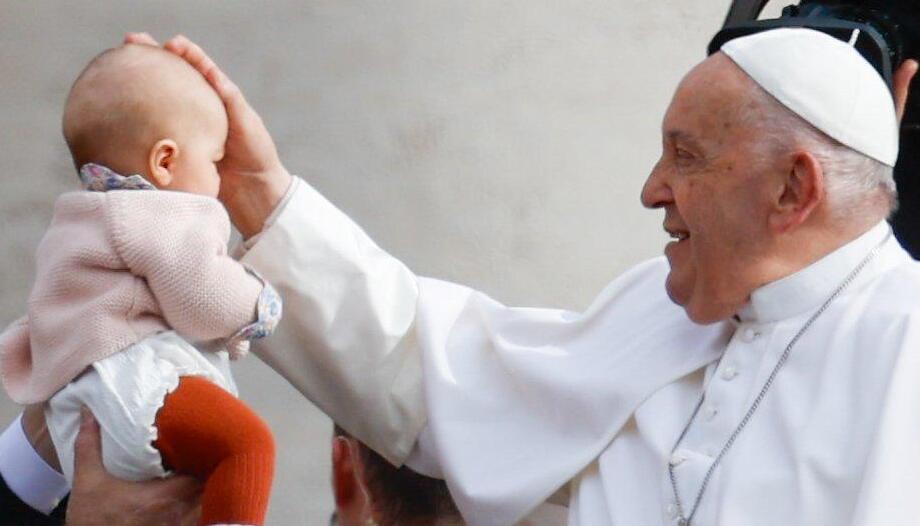"Every gift of a child, in fact, reminds us that God has faith in humanity, as underlined by the motto 'Be there, more youth, more future,'" the Holy Father began his remarks at the fourth edition of the General Birth Rate Our 'being there' is not the result of chance: God wanted us, he has a great and unique plan for each one of us".
With this perspective, "it is important to meet and work together to promote the birth rate with realism, foresight and courage," added the Pontiff, who broke down these three concepts.
"Human beings are not problems."
First of all, "realism. In the past, there was no lack of studies and theories that warned about the number of inhabitants of the Earth, because the birth of too many children would create economic imbalances, lack of resources and pollution. I have always been struck by how these theses, now outdated and long outmoded, spoke of human beings as if they were problems," the Pope reflected.
"At the root of pollution and hunger in the world are not the children who are born, but the decisions of those who think only of themselves, the delirium of unbridled materialism, of a consumerism that, like a malignant virus, erodes at the root the existence of people and society," he said.
With words that sounded like St. Paul VI, Francis stressed that "the problem is not how many of us there are in the world, but what kind of world we are building; it is not the children, but selfishness, which creates injustices and structures of sin, to the point of interweaving unhealthy interdependencies between social, economic and political systems".
Government commitment in favor of the family
"No, the problem of our world is not that children are born: it is selfishness, consumerism and individualism that make people full, lonely and unhappy. The number of births is the first indicator of the hope of a people. Without children and youth, a country loses its desire for the future," Pope Francis continued.
On this point, the Holy Father called for "a greater commitment on the part of all governments, so that the younger generations can realize their legitimate dreams. It is a matter of making serious and effective choices in favor of the family. For example, putting a mother in a situation where she does not have to choose between work and childcare; or freeing many young couples from the burden of job insecurity and the impossibility of buying a home".
It is also important to "promote, at the social level, a culture of generosity and intergenerational solidarity, to review habits and lifestyles, renouncing the superfluous to give the youngest a hope for tomorrow, as happens in many families".
Courage to young people
The third word is "courage," he continued. "And here I address myself especially to young people. I know that for many of you the future may seem worrying, and that between the falling birth rate, wars, pandemics and climate change, it is not easy to keep hope alive. But do not give up, have faith, because tomorrow is not something inescapable: we build it together, and in this 'togetherness' we find above all the Lord."
"The birth rate challenge is a matter of hope."
Last year, the Pope was also present at the meeting of the General Birth Rate. In an interview with Omnes, its promoter, Gianluigi De PaloHe said that "a world birth pact is a proposal that could be discussed at the international level". De Palo also recalled some words from the Pope's speech.
"The challenge of the birth rate is a matter of hope. Hope is nourished by a commitment to the good of each one of us, it grows when we feel involved in giving meaning to our lives and to the lives of others. Nurturing hope is therefore a social, intellectual, artistic and political action in the highest sense of the word; it is putting one's own abilities and resources at the service of the common good, it is sowing the future".
The General Statements of the Birth Rate are a initiative of Fundación para la Natalidadand their meetings bring together numerous civil, public, private companies and individual initiatives around the demographic problem, which, in their opinion, should unite the whole country regardless of their political or cultural choices.
Italy and the Old Continent, "without hope for tomorrow".
Pope Francis also referred today to the problem in Italy, which is the problem in many European countries, as he addressed Omnes on several occasions: "In Italy, for example, the average age is currently forty-seven, and new negative records continue to be broken. Unfortunately, if we were to base ourselves on these data, we would be forced to affirm that Italy is progressively losing hope in tomorrow, like the rest of the world, the rest of Europe: the Old Continent is becoming older and older, tired and resigned, so busy exorcising loneliness and anguish that it no longer knows how to savor, in the civilization of the gift, the true beauty of life".
A work of hope
At the beginning of his speech, Pope Francis had addressed Gianluigi de Palo: "Thank you Gianluigi and all those who work for this initiative. I am happy to be with you again because, as you know, the issue of childbirth is very close to my heart".
In concluding, the Pontiff noted: "As the mothers and fathers of the Foundation for Childbirth, who organize this event every year, do, this work of hope helps us to reflect, and it is growing, involving more and more the world of politics, banking, sports, entertainment and journalism. Dear friends, thank you for what you do, thank you all. I am close to you and accompany you with my prayers. And I ask you, please do not forget to pray for me".







